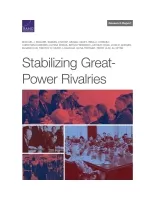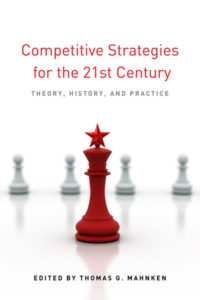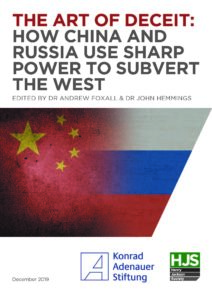 The global alignment of value-sharing democracies historically has been associated with stability, but the rise of revisionist powers promises greater volatility, according to a new analysis.
The global alignment of value-sharing democracies historically has been associated with stability, but the rise of revisionist powers promises greater volatility, according to a new analysis.
Classic rivalries have tended to focus on material factors, whether land, resources, or control of populations. More-recent ones have largely been about status, position, and ideology. One interesting finding with particular relevance to the current moment is that positional (political) disputes can be as important as territorial ones in prompting conflict, say the authors of the RAND report, Stabilizing Great-Power Rivalries:
The emerging strategic competitions between the United States and both China and Russia raise serious grounds for concern about the stability of both rivalries and the future is likely to be even more volatile. To ensure stability—and avoid war—the policy response to intensified great-power competition should be nuanced and go beyond merely bolstering capabilities to counter rivals.
 The 2018 National Defense Strategy (NDS) issued a wake-up call, citing “increased global disorder, characterized by decline in the long-standing rules-based international order” and the “reemergence of long-term, strategic competition from the “revisionist powers” – China and Russia. “It is increasingly clear,” the strategy concluded, that Beijing and Moscow “want to shape a world consistent with their authoritarian model—gaining veto authority over other nations’ economic, diplomatic, and security decisions.”
The 2018 National Defense Strategy (NDS) issued a wake-up call, citing “increased global disorder, characterized by decline in the long-standing rules-based international order” and the “reemergence of long-term, strategic competition from the “revisionist powers” – China and Russia. “It is increasingly clear,” the strategy concluded, that Beijing and Moscow “want to shape a world consistent with their authoritarian model—gaining veto authority over other nations’ economic, diplomatic, and security decisions.”
The RAND report suggests otherwise:
The major U.S. rivals today seek what they see as their rightful places in world politics as much as, or more than, territorial gains or damage to the United States or other democracies. If the United States is willing to offer signifiers of status in, for example, international institutions and the ways in which it handles major crises and if it is also willing to constrain, at least slightly, its own deployments and policies out of respect for its rivals’ interests, it could both create a trade space for achieving other goals and reduce the incipient instability of the two rivalries.
Meanwhile, the global alignment of value-sharing democracies represents another form of structural constraint that historically has been associated with stability, say RAND analysts Michael J. Mazarr, Samuel Charap, Abigail Casey, Irina A. Chindea, Christian Curriden, Alyssa Demus, Bryan Frederick, Arthur Chan, John P. Godges, Eugeniu Han, et al.
A trend of growing mutual revisionism may be underway, in which China is increasingly determined to challenge perceived U.S. dominance of the international order and value-promotion efforts, while the United States is more committed to confronting what it sees as an ideological challenge, the report adds:
 Chinese efforts to curb foreign academic partnerships, strengthen ideological education in Chinese colleges, and crack down on “irrational” outbound investment have reduced the ranks of moderate voices and encouraged criticism of the United States and the West….. Perceived ideological competition is rising, and the role of political and social influence-seeking and trade disputes has contributed to a sense of growing confrontation and a reduced focus on shared interests. …. Chinese official statements and unofficial writings make clear that Beijing retains a significant degree of concern about alleged U.S. intent to interfere in Chinese domestic affairs with the goal of overturning CCP rule and promoting a democratic transition. Broadly speaking, however, official U.S. policy has sought to allay these concerns, broadcasting many signals of acceptance of the essential legitimacy of the Chinese government.
Chinese efforts to curb foreign academic partnerships, strengthen ideological education in Chinese colleges, and crack down on “irrational” outbound investment have reduced the ranks of moderate voices and encouraged criticism of the United States and the West….. Perceived ideological competition is rising, and the role of political and social influence-seeking and trade disputes has contributed to a sense of growing confrontation and a reduced focus on shared interests. …. Chinese official statements and unofficial writings make clear that Beijing retains a significant degree of concern about alleged U.S. intent to interfere in Chinese domestic affairs with the goal of overturning CCP rule and promoting a democratic transition. Broadly speaking, however, official U.S. policy has sought to allay these concerns, broadcasting many signals of acceptance of the essential legitimacy of the Chinese government.
China’s ideological affinity with Russia means that it will not see the United States as a partner against that potential enemy [of climate change], the authors add. This absence of any common enemy deprives the relationship of a potential influence in favor of stability and enables a deepening antagonism. RTWT







